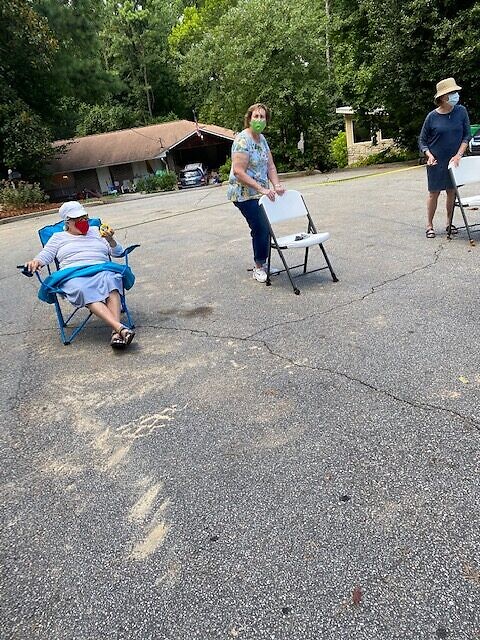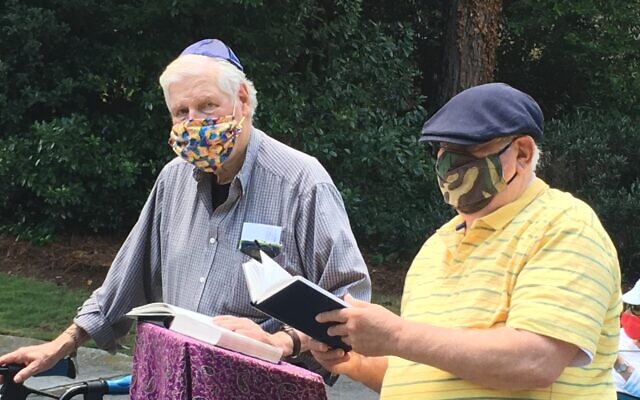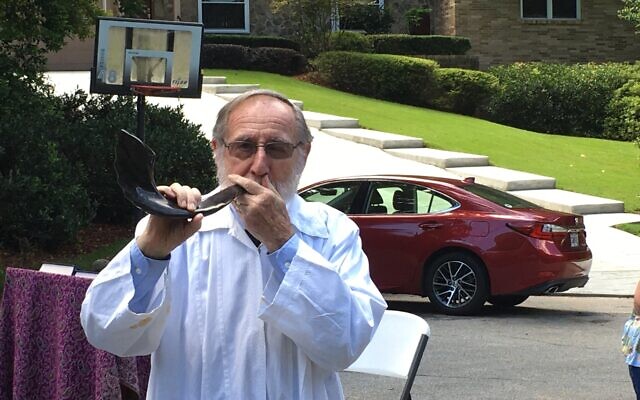Orthodox Seniors Weigh High Holiday Options
While they are limited from attending services in person, Toco Hills seniors discuss ways to observe holidays communally.
For those of us who are Orthodox and older than 65, some with health concerns, celebrating the Jewish high holidays this year will be entirely different from the past. For most of us, a Zoom service is not an option because we do not use technology on Shabbat or Jewish holidays. We spoke to several of our contemporaries in the Toco Hills neighborhood about their plans: had they located outdoor or indoor senior-appropriate services, will they pray at home alone, can they travel to out-of-town family members, or will they do something else?
We Lipis and Shapiro families have been successfully sheltering in place. In our comfortable yards and homes, we have not felt oppressively confined, and we have taken appropriate measures to see loved ones in person. However, we greatly miss regular synagogue attendance, shared Shabbat meals and unrestricted socializing with friends.
All families in this story own high holiday prayer books and know the services well, but praying at home is a lonely choice. Even if neighborhood synagogues manage to safely accommodate their large general high holiday attendance, they have yet to offer acceptable alternatives for our high-risk population.
International Travel?
We Lipises considered another option. Our son and daughter-in-law, who live in Berlin, invited us to rent an available apartment in their building. We would fly to Berlin in business class to minimize contacts on the plane, at a cost of $4,500 for two people, and to avoid changing planes in New York, we could fly from Atlanta to Amsterdam or Paris and then continue to Berlin. But the risk remains of contracting the virus at the Atlanta or European airports. We might need to be tested for the virus here or in Germany, and even then, quarantine ourselves for 14 days. Even though we would be with beloved children and grandchildren and share meals together, it is unlikely that we or our Berlin family would go to services because of possible COVID-19 contamination.
Surprisingly, our son called again from Berlin. On a recent long train ride he saw no safe distancing, few masks, and people were coughing and sneezing, which is equally possible on an airplane trip. The size of the Berlin apartment and our inability to enjoy Berlin as we usually do settled it. We’re staying home.
Outdoors Break-the-Fast?
We Shapiros are fortunate to live within a few blocks of our children and grandchildren. They attend a different Toco Hills synagogue from us; however, we were always together for Yom Tov meals, joined together at Congregation Beth Jacob for the final Ne’ilah service, and ended the Yom Kippur fast with close friends. We are encouraging our children’s families to go to their synagogue this year. They won’t join us for meals or the Ne’ilah service, yet we look forward to breaking the fast with them and perhaps a few others, outside.
Safe at Home
Aware that circumstances may change, the following families told us how they expect to spend the high holidays this year.
Rabbi Michael and Marcia Kramer have medical concerns. They decided not to attend any synagogue services, including the high holidays, at any of the seven synagogues within walking distance of their home. Even if one of these congregations manages to safely distance and protect all attendees, this couple will not take the chance of getting sick. Marcia is most troubled by her inability to hug and kiss her grandchildren, whom she hasn’t touched for months. Although she has kept busy with meaningful and fulfilling activities at home, not attending services pains her.
Jack Shenk, who lives at the Holbrook senior living community, has no transportation to Beth Jacob, the synagogue to which he and many members of his family belong. He decided against Zoom services at a non-Orthodox synagogue and is content to observe the high holidays alone, secure in the fact that he has yartzheit (memorial) candles for Yom Kippur, will use his own prayer books and is comfortable reciting the services himself.
Lynn and Ed Koffsky wanted to join their two sons and their families in the New York area, but the situation was far from ideal. In New York, they would have to quarantine themselves for 14 days at one of their son’s homes, and after that, because of their age and health conditions, still would not join them for services at their synagogues. The Koffskys longed to be with family, but physical contact with them would have been impossible. This year they will be home for the high holidays, and after completing prayers privately, they will sit outside to greet friends and neighbors.
Fred and Gloria Glusman may not pray together this Yom Tov. Gloria will be home, but Fred, who is among the regular high holiday prayer leaders, is hoping to join COVID-19-compliant congregants at Beth Jacob. According to the synagogue’s requirements, a man his age must present a doctor’s note affirming that he does not have the coronavirus, and Fred plans to get that note. At the same time, he’s hopeful that the pandemic will be less threatening toward the end of September. If the pandemic remains as it is close to the high holidays or becomes even more alarming, Fred will daven at home with his wife. The Glusmans would not consider traveling elsewhere because they feel safer at home.
Street Prayer?
Seniors we interviewed told us about Israelis who, in response to the pandemic, have begun to daven outdoors near their homes, even in the street. We wondered if our cohort could get together for portions of the Yom Tov services at a social-distancing, mask-wearing, outdoor prayer space at a convenient site, perhaps at one of the large neighborhood cul-de-sacs. Fred Glusman offered to lead part of the services, be one of the shofar-blowers, and run the Yizkor memorial service on Yom Kippur.
Managing our own group would necessitate scheduling and organization. We would bring our own chairs, with women and men sitting separately, and have the task of identifying people to lead parts of the davening and read the Torah with correct cantillation. A gigantic outdoor tent, like the ones several synagogues may use, would be problematic because of uncertain weather, and many of us may have difficulty hearing outdoors.
Our goal is to enhance the intensity and meaning of the high holidays through communal celebration. Ideally, we want to be with our families, gain inspiration from the rabbi’s sermons, stand together as we hear the shofar, and enjoy the company of our friends and neighbors. Yet, for now, the wisest solution for our demographic may be to pray at home.
For those observing the high holidays in isolation, Toco Hills synagogues are preparing a guide for a shortened Orthodox service containing the essential prayers, and volunteers will move through the neighborhood to blow the shofar, enabling listeners to fulfill this high holiday mitzvah. At the same time, these synagogues continue to work on ways to safely welcome older congregants to their high holiday services.
Allen Lipis and Chana Shapiro are regular columnists for the AJT and members of Beth Jacob in the Toco Hills community.





comments